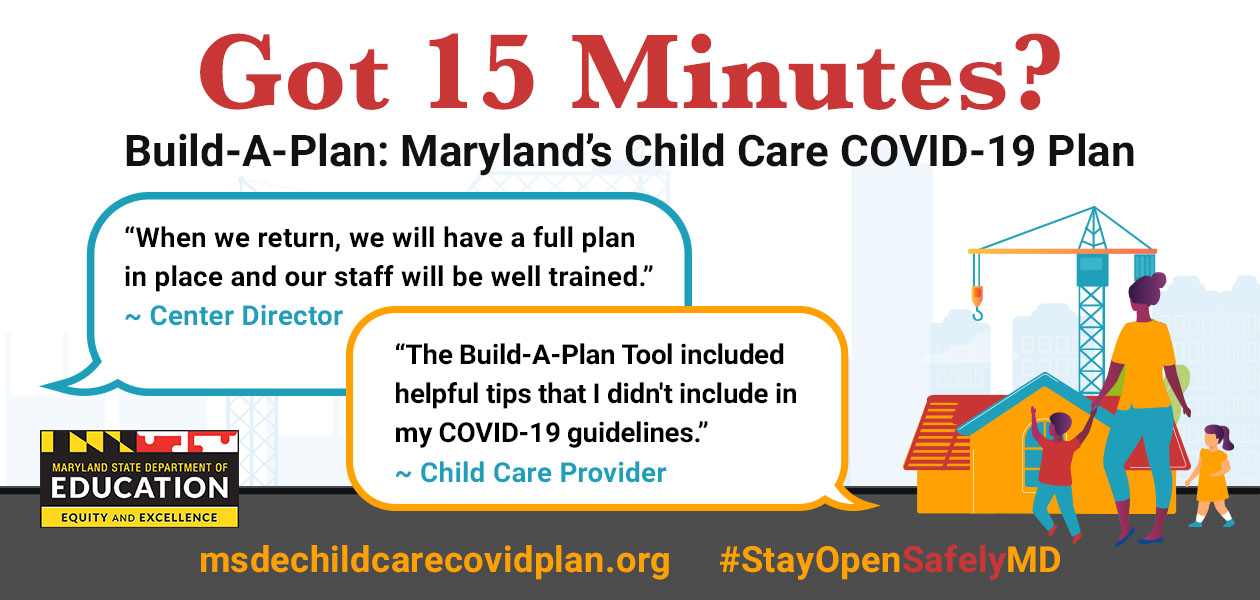JULY 22, 2022 COVID-19 Guidance for Child Care Facilities
Got 15 Minutes? Develop Maryland's Child Care COVID-19 Plan using The Build-A-Plan Tool here.
In just 15 minutes, the Build-A-Plan Tool can help overwhelmed center-based and family child care providers develop Maryland’s Child Care COVID-19 Plan to follow state regulations and guidance, use best practices to limit the spread of COVID-19, and make feasible decisions that work best for their individual program.
Learn how to “Stay Open Safely with Confidence” and develop Maryland’s Child Care COVID-19 Plan here.
.png) Registration for the Child Care & COVID-19 Training is now open!
Registration for the Child Care & COVID-19 Training is now open!
The training is designed to equip child care providers and caregivers with the knowledge they need to stop the spread of coronavirus disease 2019 (COVID-19) in their child care facilities.
Course information and registration is available on the Training page of our website. https://earlychildhood.marylandpublicschools.org/training
All licensed child care programs are now able to reopen. Child care providers are no longer required to complete a Child Care Reopening Verification. Please work with your licensing specialist or region manager for any assistance in following health and safety guidance.
FDA Updates on Hand Sanitizers with Methanol (7/22/2020)
FDA is warning consumers and health care providers that the agency has seen a sharp increase in hand sanitizer products that are labeled to contain ethanol (also known as ethyl alcohol) but that have tested positive for methanol contamination. Methanol, or wood alcohol, is a substance that can be toxic when absorbed through the skin or ingested and can be life-threatening when ingested.
The agency is aware of adults and children ingesting hand sanitizer products contaminated with methanol that has led to recent adverse events including blindness, hospitalizations and death.
Methanol is not an acceptable active ingredient for hand sanitizers and must not be used due to its toxic effects. FDA’s investigation of methanol in certain hand sanitizers is ongoing. The agency will provide additional information as it becomes available.
Consumers who have been exposed to hand sanitizer containing methanol and are experiencing symptoms should seek immediate treatment for potential reversal of toxic effects of methanol poisoning. Substantial methanol exposure can result in nausea, vomiting, headache, blurred vision, permanent blindness, seizures, coma, permanent damage to the nervous system or death. Although all persons using these products on their hands are at risk for methanol poisoning, young children who accidently ingest these products and adolescents and adults who drink these products as an alcohol (ethanol) substitute, are most at risk.
FDA reminds consumers to wash their hands often with soap and water for at least 20 seconds, especially after going to the bathroom; before eating; and after coughing, sneezing, or blowing one’s nose. If soap and water are not readily available, the Centers for Disease Control and Prevention (CDC) recommend consumers use an alcohol-based hand sanitizer that contains at least 60 percent ethanol (also referred to as ethyl alcohol).
FDA remains vigilant and will continue to take action when quality issues arise with hand sanitizers. The agency is especially concerned with:
- The dangers of drinking any hand sanitizer under any conditions. While hand sanitizers with possible methanol contamination are more life-threatening than those that are not contaminated, FDA urges consumers not to drink any of these products.
- Certain hand sanitizers that may not contain a sufficient amount of ethyl alcohol or isopropyl alcohol.
- Hand sanitizers that are sold or offered for sale with false and misleading, unproven claims that they can prevent the spread of viruses such as COVID-19, including claims that they can provide prolonged protection (e.g., for up to 24-hours).
- Products that are fraudulently marketed as “FDA-approved” since there are no hand sanitizers approved by FDA.
- Products packaged to appear as drinks, candy or liquor bottles, as well as products marketed as drinks or cocktails because their appearance could result in accidental ingestion or encourage ingestion. Children are particularly at risk with these products since ingesting only a small amount of hand sanitizer may be lethal in a young child.
Methanol Contaminated Product List


